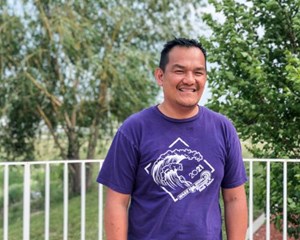A few months ago, a hurting young boy I'll call Ben came to the Ranch. Ben was largely nonverbal and hadn't been to school since 2018. He spent his first two weeks at the Ranch refusing to leave his room. As he became more comfortable with his surroundings and the people caring for him, he started venturing out of his room, and after a few more weeks, he was able to go into the dining center and sit with staff. He didn't eat there that day, but we all celebrated the courage it took him to leave the cottage and be in a big space with other people.
Fast forward to July...three other high-energy Ranch boys have taken Ben under their wing. He struggles to keep up with them, but yesterday they taught him how to play Gaga Ball and Volleyball. Each boy let Ben score a few times, and one of them patiently taught him how to serve a volleyball. Through it all, they encouraged him, laughed with him, and included him. While getting the exercise they need, these young boys are also learning and practicing empathy and kindness.
The science backs up what we see every day at the Ranch, that wellness and physical activity are essential to mental health and healing.
"We know that physical activity is healthy and that lack of physical activity is a risk factor for depression and anxiety," said Dr. Wayne Martinsen, Psychiatrist and Medical Director at Dakota Boys and Girls Ranch. "For adults, physical activity (20 minutes a day, five days a week, at an intensity that makes is slightly difficult to carry on a conversation) is as effective for the treatment of depression and anxiety as typical antidepressant medications."
While there isn't as much research on the impact of exercise on depression in adolescents, an analysis of data from several medical databases published in JAMA Pediatrics concludes that regular exercise for children over age 13 can lead to a reduction in depression symptoms. The Centers for Disease Control and Prevention (CDC) recommends 60 minutes of exercise per day for children ages 6-17.
Dr. Martinsen, who is pursuing certification from the American College of Lifestyle Medicine, encourages his patients to address all six pillars of well-being (exercise, nutrition, sleep, stress, risky behavior reduction, and social connection).
The Wellness Coordinators and Physical Education teachers at the Ranch address these pillars of well-being by getting kids active, teaching them healthy eating habits, providing social connection through group activities and games, and helping them find activities they can enjoy not only while they are at the Ranch, but throughout their lives.
And they all believe wholeheartedly that physical activity and mental health go hand-in-hand.
Christian Kjelland
Wellness Coordinator, Fargo
When Christian Kjelland applied for a job at the Ranch 20 years ago, he wasn't looking for a way to make a difference.
"I was just looking for a job and saw a Ranch booth at a job fair," Christian said. "I could relate to the mission of helping kids who are struggling because I was that kid. I was working here probably three months before I realized I could be part of something big."
Christian was born in the Philippines, and from age 8-14, he lived in a Philippine orphanage—except for the many times he ran away and lived on the streets. At the age of 14, he moved to North Dakota when he was adopted by a Park River, ND, family.
"I tell the kids I know what it's like to feel like nobody cares, that feeling of not being wanted and losing hope," Christian said. "But if you know what you want to accomplish and take it step by step, there is always hope. I have walked their path and was given a chance. At the Ranch, I can give back."
As Wellness Coordinator, Christian's main goals are to give kids opportunities to be "normal" and to feel a sense of belonging.
"We can teach kids how to live within our four walls, but they aren't going to be here forever," Christian said. "We provide tools and experiences that teach them how to live and grow in their community."
In addition to giving them the chance to try new activities and learn new things, wellness activities can help Ranch residents cope with overwhelming emotions.
"If a kid has a bad phone call, is sad, or gets in an argument, getting outside or being physically active can help them forget about it for a while," Christian said. "They'll ask me if we can shoot hoops or go for a walk. Maybe later, they'll be in the right mind to talk through why they were upset. But in the moment, it's about being present and giving them the space they need."
Sometimes providing kids with a positive way to release their rage or frustration prevents them from lashing out at other people and things.
"If they have the option to punch a wall, break glass, or work out, they'll probably choose working out or shooting hoops—at least after they've been here a while and learn that it works," Christian said. "It's much easier than facing the consequences of the negative ways they've reacted in the past."
Christian also believes the activities he plans for the kids helps them make connections—connections they've often missed out on. Swimming at a community pool, going to a movie, fishing, volunteering, going to the zoo, or spending the day at the lake, are all ways Ranch kids can build strong connections with each other, Ranch staff, and people throughout the community.
"Ranch kids are sometimes labeled as the 'bad kids,' but they are just kids. Just yesterday we were at the swimming pool and I asked one of my co-workers if they could pinpoint which kids were at the Ranch just by looking at them. She couldn't," he said. "Our kids look and act like every other teenager. It's our job to help them feel that way too."
Dalton Cooper
PE Teacher, Minot
Dalton Cooper was an active kid. He played baseball, football, and basketball and, even as a young child, was always on the move.
"I always had to be moving or fidgeting with something," Dalton said. "So, when it came time to go to college, I knew I wanted to do something that wouldn't tie me down to a desk."
Dalton said his decision to be a Physical Education teacher was influenced by coaches he had throughout childhood and high school.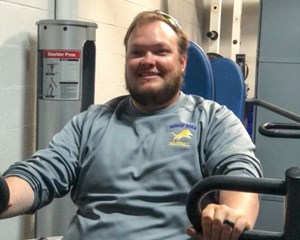
"They were great role models who molded me into who I am today. I wanted to do that too," he said.
Dalton graduated from Minot State University, Minot, ND, and started that fall as a PE teacher at the Ranch. After three years, he continues to love the work and the kids.
"There is a stereotype that the kids here are bad, but it's the exact opposite," Dalton said. "It was a little nerve-racking going in because I was a new teacher and didn't know what to expect in terms of behaviors. But it's been awesome. These kids need guidance, and the small class sizes allow us to give them more one-on-one attention."
Because Dalton knows each of his students well, he understands what they need from him when they get frustrated, upset, or heightened.
"It's different for every student," he said. "Some kids want you to ask them what's wrong and help them problem-solve. Others just need you to step away and give them a moment to recollect themselves."
At the Ranch, Dalton can teach students a variety of games like badminton, pickleball, baseball, and flag football.
"Maybe it's something brand-new to them or something they've only tried once or twice, he said. "When we start a new sport, we always have a few kids who aren't confident enough to try it and want to sit out. I find alternative things for them to do, like walking laps or using the elliptical. Once they see the rest of the class participating and having fun, they decide to try. We build on that, and their confidence and abilities grow throughout the weeks and months they are here."
The students' hesitance to participate often comes from their lack of fine motor skills, coordination, and visual and spatial awareness.
"Catching, kicking, and throwing are easy for some of our kids, but for others, they are really challenging," he said. "Our set-up allows us to put kids with similar skill levels together. If I have a class that's more athletic, I can teach them the rules, do a few drills, and get right into playing the game. For the kids who need a little bit of extra work, we can slow the lesson down and give them more time to learn and practice."
While Dalton knows some of the children's lack of motor skills and coordination are trauma-related, he believes it also stems from a lack of experience.
"Many of our kids have been in and out of the system or living on the streets. They haven't been going to school, so haven't had the opportunity to play recreational sports or even sports in the classroom," Dalton said. "A big part of development is doing things at a young age that you can build on as you get older. They've missed out on those foundational skills. It's just like math. If you don't go to school, your class will be doing long division while you're still stuck on adding and subtracting."
A rocky start tends to launch a vicious circle of kids not understanding, not wanting to admit what they don't know, getting further behind, and then not even trying because they lack confidence and expect they will fail.
Dalton's goal is to find at least one sport or activity that each student enjoys so they have something they can do to relax.
"For me, it was baseball," Dalton said. "I could get away from everything and focus on something I was good at. I want to find that for our kids so they have an outlet. If they're having a rough day, they can shoot hoops, run, or lift weights to ease the pressure and get their mind off what's bothering them."
Dalton said he has seen a lot of kids find that outlet in the weight room.
"They are hitting personal records with the bench press or the deadlift and are so excited," he said. "One of my students discovered a love for basketball. When he came here, he couldn't dribble or even hit the basket. Now he is making three-pointers. You see a lot of lightbulb moments where they are like, 'I can do this!'"
In addition to relieving stress, relaxing the mind, improving cardiovascular health, and leading to overall wellness, Dalton said physical activity has a major impact on mental health.
"If you feel like you can't do something, you will be discouraged and lack confidence. But if you feel physically strong and healthy, you'll be able to do a lot more and just feel better overall, which impacts how you feel about yourself."
Dalton works tirelessly to build his student's confidence.
"I tell them they can't expect to be good at things if they've never done them. Like when we're playing Frisbee golf and a kid tells me he can't throw a Frisbee. Of course he's not good at it if he's never done it, but that doesn't mean he can't learn," he said. "It goes back to them not being in school or in PE—their confidence level is very low on even the simplest tasks. I've done my job if I can get them to try and then encourage and teach them so they can improve their skills and even enjoy new things."
Dalton spends his time outside of work with his wife and two small children, walking and going to the park. He coaches baseball so they spend a lot of time at the baseball field as a family. He also enjoys hunting, fishing, hiking, and weightlifting.
As for Ranch kids, Dalton says they are phenomenal.
"I tell people I work at the Ranch, and they say, 'I'm sure those kids are a handful.' But, they aren't much different than kids at any school," he said. "Once you give them a little extra guidance and structure, they are great kids. Every one of my Ranch students has made a difference in my life, and I think we've made a difference in theirs."
Erik Olson
PE Teacher, Fargo
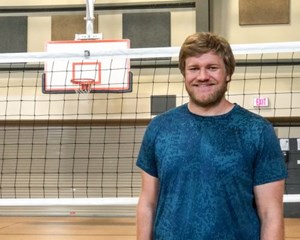 Erik Olson grew up in a family of educators and played sports throughout childhood and college, so when it came time to choose a career, teaching/coaching was an easy choice. He knew his passion was for working with kids in some capacity.
Erik Olson grew up in a family of educators and played sports throughout childhood and college, so when it came time to choose a career, teaching/coaching was an easy choice. He knew his passion was for working with kids in some capacity.
After graduating from North Dakota State University, Fargo, ND, where he played Bison football, Erik started teaching in the public school system. When he saw the open position at the Ranch, he thought it'd be a good fit.
"I've been here one year, and Dakota Memorial School is unlike any other school I've ever been at," Erik said. "The support everyone gives each other is amazing, and the kids are great to work with."
Erik said the smaller class sizes allow him to get to know the kids, their interests, and what they like to do outside of the school day.
"Asking questions and paying attention helps me build positive relationships with our students. They know I recognize their interests, and want what's best for them," Erik said.
Erik's main goal for Ranch kids is to create enjoyment of physical activity so when they leave the Ranch or graduate high school, they continue to be physically active.
"By exposing them to a wide variety of activities they can do outside of school, things they don't need special equipment to do," Erik said, "I'm working towards my big goal of helping them to develop lifelong habits of physical activity."
Erik has altered his teaching style as he has learned from the kids.
"In my earlier years of teaching, I would have insisted every child participate in the activity we are doing that day," he said. "But I've seen how much progress students make when you give them options and let them join in slowly. If a student wants to walk around the gym instead of participating in the activity, I'll let them do that for a class period. The next day I'll encourage them to participate with the class, even just for a short while. Eventually, most of them engage and want to be involved."
Erik says physical activity has a big impact on mental health, and has seen firsthand how exercise improves his mood and stress levels. He also sees it in the students, and the benefit of movement breaks for kids who can't focus in the classroom.
"Our teachers are good about offering movement breaks or allowing students to move around in the classroom," he said. "We have standing desks, rocking chairs, and under-the-desk pedals that all help our kids focus."
Erik incorporates the Ranch's trauma-sensitive culture into his classes and his work with students. If a student has a bad day, he doesn't hold it against them. Every day is a chance for a new start.
He teaches basic skills before getting into playing the game so his students can build their confidence. For instance, if they are learning to play pickleball, they practice hitting the ball back and forth without the net and without boundaries so they can build their confidence. When they play volleyball, Erik changes the rules so the ball can bounce one time before they hit it back over.
"That really increases the engagement in games because everyone feels like they have a chance to be successful," Erik said. "Most of the kids come here with pretty low self-confidence and self-esteem. Making adjustments and celebrating their strengths helps build their confidence so they aren't afraid to try new things."
Erik also puts a lot of focus on teaching life skills through sports.
"I make sure it's not just about the game, but also about sportsmanship and respect. Yes, I want them to be physically active, but respect and sportsmanship are just as important," Erik said. "Some of them have never experienced respect from others, so it needs to go both ways. I want to show them how to be respectful, but also to feel it."
Ranch kids are like all teenagers, with similar interests and challenges. And just like everyone, they have good and bad days. Erik said the best part about Ranch kids is their willingness to be open to new experiences. While it often takes time, he sees so much growth and progress in his students. They don't always see it, so he often reminds them how much they've grown.
Erik's favorite part about working at the Ranch, besides the kids, is the ability to express his faith openly.
"I love how the Ranch is Christ-centered. Every morning, the teachers all meet for prayer in the hallway. It's a great starting point for each day and helps us focus on what's important," Erik said. "We couldn't do this on our own. But with Christ at our center and with His love, we can provide our kids with the love and support they need."
Lucas Michaelson
PE Teacher, Bismarck
Lucas Michaelson said he zigzagged his way to teaching Physical Education and Health at Dakota Boys and Girls Ranch. After changing his college major many times, he landed on teaching, despite trying to avoid joining the profession of almost everyone in his family.
"In high school, I knew I wanted to be a teacher after helping my Dad coach 8-year-old wrestlers, but then I didn't want to admit it in college. I kept telling myself, 'Everyone else is a teacher, but I'm not'," he said. "I finally figured it out after about two years of wasting my time. Once I made that decision, I buckled down in my classes and made it happen."
When he graduated from Minot State University, Minot, ND, Lucas moved back to his hometown of Williston, ND, to teach PE before deciding to spread his wings and move out of Williston. He accepted a job at the Youth Correctional Center (YCC) south of Bismarck, ND, and it was there he learned about the Ranch from a co-worker who was leaving YCC to teach at the Ranch. 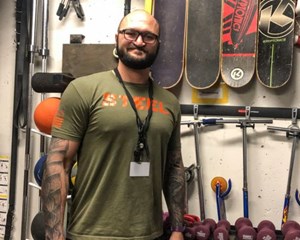
"I told her the Ranch was where I really wanted to be and asked her to let me know if there was ever an opening. A couple of years later, she called, I applied, and here I am—exactly where I am meant to be," Lucas said.
When Lucas worked in the middle school in Williston, he said he gravitated to the kids the other teachers couldn't handle.
"We would have meetings to talk about how we could help these kids be successful, and the other teachers would talk about their behaviors. I didn't know what they were talking about, Lucas said. "I wasn't having any problem with them in my classes. Then I went to YCC and realized that these are the kids I really like."
"I'm hard on them and hold them accountable, but they take it really well," he said. "Most of them haven't had anyone to hold them accountable at home, and they appreciate the structure. It lets them turn their brains off survival mode for a little bit."
Through questions he asks in Health classes, Lucas has learned that the vast majority of Ranch kids haven't had great models when it comes to health and well-being.
"How many of you have obesity in your family? How many have relatives with heart disease? How many have family members at home that smoke? They almost all raise their hand for every question," Lucas said. "Most of our kids have a family history of being sedentary and don't know much about fitness. They have to fend for themselves in that department. Teaching them how to build a lifetime of fitness is so important."
While Lucas doesn't teach any differently at the Ranch than he did in public school, he does think he has an approach that is different from many PE teachers.
"I focus more on strengthening and being fit throughout life," he said. "The most important thing in physical education is showing kids how lifelong fitness can help them create a better lifestyle. It doesn't have to be all about excelling in sports."
He says people's ability to be active throughout their lives starts with basic strengthening exercises, with the added benefit of improving their performance for those who are interested in sports.
"I tell my students they'll automatically be better at basketball if they can jump higher. How do you jump higher? You strengthen your legs," Lucas said. "I've seen so much success in my classes. I had a girl that improved her deadlift by 60 pounds since we started. She had no idea she could lift that much and is really determined to work hard and keep improving."
Lucas also emphasizes that getting stronger physically helps the kids be stronger mentally.
"When you have a good workout, your brain releases positive chemicals into your body. Eventually, as you keep doing it, you're going to be a happier person overall," he said.
In addition, Lucas sees his students becoming more confident as they buy into the benefits of exercise and start participating.
"They start believing in themselves and encouraging each other," he said. "They come in so down on themselves and are surprised by what they can do. They can be really proud of what they accomplish. I tell them, 'With weights, you can't fake it. You either moved it, or you didn't. And if you're successful, that's all you. No one helped you.'"
In his spare time, Lucas likes to play darts, volleyball, softball, and video games. He and his wife keep busy with two teenagers and a six-month-old.
Rebecca Grondahl
Wellness Coordinator, Minot
Rebecca Grondahl started working at the Ranch in 2020 as a Youth Care Worker (now called Residential Treatment Specialist), and in April 2023, she started as Wellness Coordinator.
While she is just getting the feel of the position, she is excited to work with kids and people across campus, and to have a chance to put her studies in elementary education at Minot State University, Minot, ND, to good use.
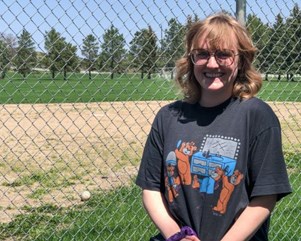 "I'm a people person. I love getting to know people and bringing them together as much as possible," she said. "This position gives me a pretty good way to do that."
"I'm a people person. I love getting to know people and bringing them together as much as possible," she said. "This position gives me a pretty good way to do that."
Rebecca said kids come to the Ranch feeling unwanted, trapped, and like they don't have a say in anything.
"My goal is to show them things they can be in control of," she said. "I spent some time with one of our boys the other day who is almost 18 and doesn't want to be here. He wants to be doing adult things. I helped him plan out three things he can work on daily to help him be better and feel better. I helped him realize he does have control over some things."
Rebecca said it's difficult for Ranch kids to see past the major issues in their lives to the things they can control, like their wellness.
"Wherever they are, they can work on their spiritual, physical, or intellectual wellness. They can find things that spark joy," she said. "I want them to realize they have choices and to see the many opportunities around them. I help them explore their interests, set goals, and get excited about things."
Rebecca plans to introduce the kids on the Minot campus to various activities, including sports, cooking, baking, games, yoga, meditation, and more. By trying out many different activities, they can discover things they like to do—things they can do to get out of their heads.
"The more you sit with your feelings and don't do anything to release them, the more you lose motivation," she said. "I see that in myself. After the long winter, I was having trouble getting motivated. I knew I would feel better if I would just go outside and move. It's the same for our kids. It's important for them to figure out what makes them feel better—like getting some fresh air, going for a walk, or getting together with other people."
Rebecca has a tight-knit family and loves to spend her downtime with them (and her Corgi, who has more personality than any dog she has ever met!). Her youngest brother lives in Florida with her mom and spends part of his summer with Rebecca in Minot.
"The kids at the Ranch remind me a lot of him," she said. "People think the kids here are completely different from other kids, and they're really not. They're very much like every kid everywhere. All kids are going through their own struggles, and some kids have more tools to handle their battles than others. Kids are here so we can give them those tools."
Talbott Pollert
Wellness Coordinator, Bismarck
Talbott Pollert started college at North Dakota State University, Fargo, ND, as a chemical engineering major, but quickly realized he was on the wrong path and switched his major to psychology.
"My aunt and a grandma both suffered from mental illness," Talbott said. "I was looking for a better understanding of what made them who they were and how their mental illnesses affected them."
When Talbott graduated from college, a friend who was working at the Ranch encouraged him to apply. Twelve years and a couple of promotions later, Talbott says because he believes in the mission and is committed to making a difference in the lives of the kids and their families, he is still here.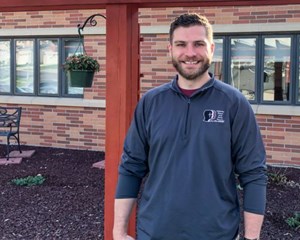
According to Talbott, most kids who come to the Ranch aren't thinking about wellness or setting physical health goals.
"It's hard for them to set goals, or even think about the future, when they are wrapped up in trauma," Talbott said. "We start by meeting their basic needs and getting them to truly feel that they are in a safe place. It's Maslow's hierarchy of needs—they can't work towards bigger goals until their basic needs are met."
Talbott sees a lot of kids coming in who have experienced food insecurity and trauma and don't trust the adults in their lives. Regardless of where they've come from or what they've been through, he believes everyone deserves a chance to heal and succeed.
"We say all the time around here that people would do well if they could," Talbott said. "We provide an environment that gives them the opportunity to improve. As Wellness Coordinator, my main goal is to help our kids find a path to self-improvement."
Sometimes it's the little things that can start them on this path.
"Developing a structured sleep schedule, doing their first pushup, or having a better understanding of healthy eating," Talbott said, "are all simple ways kids can make small and manageable improvements in their lives."
Because so many Ranch kids don't trust anyone, Talbott starts by proving he is a safe and trusted individual who treats them with compassion and care.
"You don't jump right in and ask them to tell you all the bad things that have happened to them," Talbott said. "Just like with any relationship, you get to know people by spending time with them and asking about their interests, likes, and hobbies."
Talbott provides a variety of activities for the residents, often based on their input and requests. They play basketball, soccer, and volleyball; ride bicycles; and go swimming. The annual hike through Theodore Roosevelt National Park is a summer favorite of the kids.
Talbott also holds a weekly recreational fitness group with a five-week workout rotation. They start with the Presidential Fitness Challenge to establish a baseline for each child's physical abilities, followed by a leg workout, a core workout, and an upper body workout. On the fifth week, they do a mile run.
"I choose to do these workouts using mostly body weight movements to show our kids they don't need special equipment or a gym to be healthy," Talbott said. "Using the weight of your body and gravity, you can exercise no matter where you are."
Talbott says physical activity and wellness are not only great for physical health but mental health as well.
"Dr. Martinsen talks about the research behind physical activity and mental health in greater detail, but basically, exercise releases chemicals in the brain that help you work through your problems and just feel better."
In his personal life, Talbott said he reminds himself to practice what he preaches.
"Because I'm so active at work, I'd be happy just watching Netflix," he said. "But I can't expect our kids to do things I'm not doing myself. So, I try to put the junk food down, make healthier choices, and work out regularly. I also enjoy bike riding and hiking with my family, and with a kindergartner and teenagers in the house, we do a lot of running."
When asked what he wants people to know about Ranch kids, he said, "I would tell them that not just our kids, but all of us, are products of our environment. Every person, no matter where they came from or what they've been through, deserves a chance to improve."
"With every child who comes to the Ranch, we have the opportunity to help them advance and grow as individuals, discover who they are capable of becoming, and understand they are more than what happened to them."
"I saw hope."
In July, a Servant Team from Messiah Lutheran Church, Lakeville, MN, worked on landscaping projects on the Ranch's Fargo campus. They also interacted with Ranch kids over lunch and while playing kickball. Before they left, one of the chaperones said she came to the Ranch expecting an atmosphere of sadness and hurt.
"But it was just the opposite," she said. "I saw joy on the faces of the kids and staff as they interacted. It is clear to me that God put some amazing people here at the Ranch to work with our kids. Instead of sadness and hurt, I saw hope."
While our kids are also hurt and sad, it's people like Christian, Lucas, Talbott, Rebecca, Dalton, and Erik who invite them to experience the joy and confidence that comes through connecting with others, managing their health, and moving their bodies.
This article was originally published in Ranch Voice: Summer 2023.
Read more stories like this and explore other issues of Ranch Voice here.


